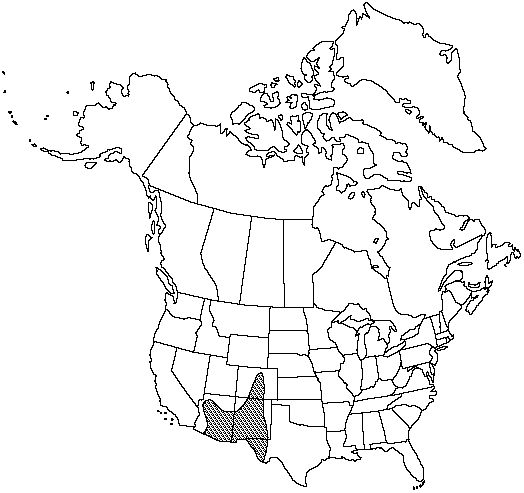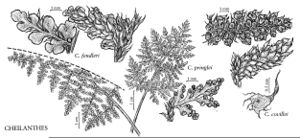Difference between revisions of "Cheilanthes fendleri"
Sp. Fil. 2: 103, plate 107b. 1852.
imported>Volume Importer |
imported>Volume Importer |
||
| Line 55: | Line 55: | ||
|publication year=1852 | |publication year=1852 | ||
|special status=Illustrated | |special status=Illustrated | ||
| − | |source xml=https:// | + | |source xml=https://bitbucket.org/aafc-mbb/fna-data-curation/src/2e0870ddd59836b60bcf96646a41e87ea5a5943a/coarse_grained_fna_xml/V2/V2_86.xml |
|genus=Cheilanthes | |genus=Cheilanthes | ||
|species=Cheilanthes fendleri | |species=Cheilanthes fendleri | ||
Latest revision as of 20:25, 5 November 2020
Stems long-creeping, 1–3 mm diam.; scales mostly uniformly brown, ovate-lanceolate, straight to slightly contorted, loosely appressed, often deciduous on older portions of stem. Leaves scattered, 7–30 cm; vernation noncircinate. Petiole usually dark brown, rounded adaxially. Blade lanceolate to ovate-deltate, 3–4-pinnate at base, 1.5–5 cm wide; rachis rounded adaxially, somewhat scaly, not pubescent. Pinnae not articulate, dark color of stalk continuing into pinna base, basal pair not conspicuously larger than adjacent pair, usually equilateral, appearing glabrous adaxially. Costae green adaxially for most of length; abaxial scales multiseriate, lanceolate-ovate, truncate or subcordate at base, without overlapping basal lobes, conspicuous, the largest 0.4–1.2 mm wide, strongly imbricate, often concealing ultimate segments, entire to denticulate, not ciliate. Ultimate segments round to oblong, beadlike, the largest 1.5–3 mm, abaxially glabrous or with a few small scales near base, adaxially glabrous. False indusia marginal, weakly differentiated, 0.05–0.25 mm wide. Sori ± continuous around segment margins. Sporangia containing 64 spores. 2n = 60.
Phenology: Sporulating summer–fall.
Habitat: Rocky slopes and ledges, found on a variety of acidic and mildly basic substrates
Elevation: 1200–3100 m
Distribution

Ariz., Colo., N.Mex., Tex., n Mexico.
Discussion
Young, sterile plants of Cheilanthes fendleri are occasionally misidentified as C. pringlei; they are distinguished from that species by having rachises that are rounded (not grooved) adaxially. Cheilanthes fendleri apparently hybridizes with both C. wootonii (T. Reeves 1979) and C. covillei (M. D. Windham, unpublished).
Selected References
None.
